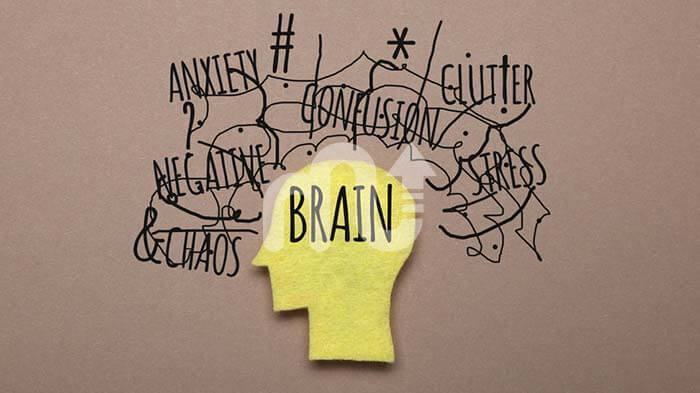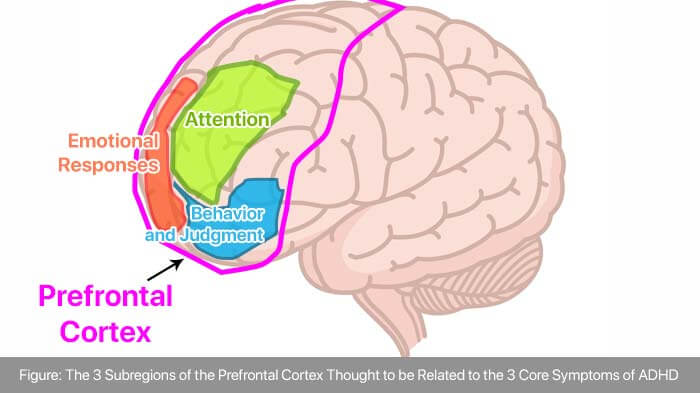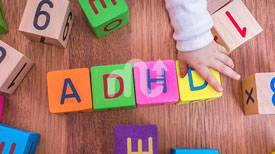ADHD: Top 35 Most Frequently Asked Questions
Whether you have ADHD diagnosed or ADHD in your family, living with ADHD can be quite challenging. Even if you get expert help, it is quite normal to have many questions in mind.

Let's take a look at the most frequently asked questions of people living with ADHD, their partners or their parents:
1- What does ADHD stand for?
ADHD stands for Attention Deficit Hyperactivity Disorder. It also happens to be called ADD (Attention Deficit Disorder). This disorder, previously only referred to as ADD, started to be named ADHD with the inclusion of hyperactivity among the symptoms. ADHD is a type of behavioral disorder that children, teens or adults can have. To get further information about ADHD, keep reading!
2- What causes ADHD?
ADHD has no single cause, and the exact causes are not yet known. Studies have found that ADHD symptoms are related to biological features in the brain. It is thought that the cause of these disorders in brain development and function is the interaction of genetic and environmental factors. To learn more about it, don’t hesitate to look at our content about the causes of ADHD.
3- How to know if you have ADHD?
You cannot be absolutely certain that you have ADHD without a specialist doctor’s diagnosis. But there are still some symptoms that may make you think about the possibility of having ADHD. Be sure to take our ADHD Test to see if you have the associated symptoms.
4- How to get diagnosed with ADHD?
ADHD can be observed differently in each person. For this reason, there are various criteria in the diagnostic process. Strong ADHD symptoms such as hyperactivity, impulsivity or carelessness and a combination of these symptoms must be observed to diagnose ADHD to you or your child. The mental health professional who evaluates the problem will also look at the following factors:
- How severe are the symptoms?
- When did the symptoms start?
- How long have the symptoms bothered you or your child?
- When and where symptoms occur?
If you need a deeper understanding, take our MentalUP ADHD Test and read our content about the diagnosis of ADHD.
5- What is the difference between ADD and ADHD?
The difference between ADHD and ADD is the hyperactivity symptom. ADD is an old term used to describe ADHD. As the diagnosis of symptoms expanded and became more specific, ADD was insufficient to describe this condition. If you want to learn more about the differences of ADD and ADHD, you can check our blog post “ADHD vs ADD: What's the Difference? Symptoms, Tests, Treatments”
6- Why can amphetamines be used to treat ADHD in children?
Because amphetamines are effective in improving the main symptoms of ADHD in the short term. Besides its positive impact towards curing main symptoms of ADHD, they cause negative side effects such as sleep problems, decreased appetite and stomach pain in the long term.
7- How does a person with ADHD think?
People with ADHD experience the world quite differently from others and have different thoughts on many topics. Because they know they are different, they think that the people around them are constantly trying to correct and change them. This further increases the stress level caused by the disorder. And within this loop of thought, the problem of focusing increases further.
8- How to treat ADHD?
There are many different options for ADHD treatment. Which of them can work best depends on the child and the family. In order to find the best options, parents are advised to work closely with other people involved in their children's lives, such as teachers, therapists, and coaches.
The types of treatment for ADHD include behavioral therapy and medications, but also include education.
The reliable educational games app MentalUP is designed by academicians and experts according to different needs and interests. So, it is one of the most effective methods for attention development and mental improvement. 🏆
You can use MentalUP’s 150+ brain-boosting games to diminish the signs of ADHD and train your brain by having fun at the same time. Don’t forget it is appropriate for different age groups, from babies to seniors. 🎮
Thanks to MentalUP’s detailed skills analysis reports, you can always keep track of your status and compare your scores with your peers. When you learn your weakness because of ADHD, you can manage them easily. ✨
9- How many people have ADHD?
According to the Centers for Disease Control and Prevention (CDC), about 6.1 million children in the U.S. between 2 to 17 years of age have ever been diagnosed with ADHD, based on data from the National Survey of Children’s Health.
10- How common is ADHD?
ADHD is seen in 11 percent of children in the U.S., and the number of diagnoses among adults continues to grow.
11- How to deal with ADHD?
In order to cope with ADHD, you should consider the behavioral therapy option, where you can learn more about how you should behave more properly. Since people with ADHD are socially different from others, it is very useful to increase their awareness to enable them to control their behavior. Read “10 Tips for People Living with ADHD” and check out the best ADHD apps for kids and adults to learn how to deal with ADHD!
12- What are the symptoms of ADHD?
ADHD symptoms and the combination of these symptoms can vary from person to person. Below is a list of common ADHD symptoms:
- Impulsiveness
- Disorganization and problem-prioritizing
- Poor time-management skills
- Problems focusing on a task
- Trouble multitasking
- Excessive activity or restlessness
- Poor planning
- Low frustration tolerance
- Frequent mood swings
- Problems following through and completing tasks
- Hot temper
- Trouble coping with stress
13- How to discipline a child with ADHD?
It is difficult to discipline children with ADHD because they may find it difficult to sit still, focus on any task or finish it, and control their reactions and behavior. But if you can read your child and the individual processes your child is experiencing correctly, you can respond to their needs and apply the necessary discipline. Be sure to follow these steps:
- Giving effective instructions
- Using time-outs when needed
- Providing positive attention
- Praising good work and behavior
- Working with school teacher
14- How does ADHD affect the brain?
ADHD causes problems with chemical messengers connecting the two areas of the brain - the prefrontal cortex and basal ganglia. Two neurotransmitters, called dopamine and noradrenaline, handle this communication between the prefrontal cortex and basal ganglia areas. It is believed that in people with ADHD there is a change in the regulation of the level of these neurotransmitters, leading to a decrease in their level and hence abnormal functioning.

15- How to get focused with ADHD?
If you have ADHD and want to work with focus, be sure to try the following:
- Plan the day in small blocks and take a break
- Divide the job into parts to fit the working time in this daily plan
- Avoid multitasking
- Keep time while working
- Use visual reminders
- Create a quiet environment to work
- Communicate with positive colleagues
16- How to talk to someone with ADHD?
When talking and building relationships with someone who has ADHD, you must first acknowledge that they are different. Understanding their needs and talking to them is the most important problem solver. Here are a few tips to consider when talking to someone with ADHD:
- Make them feel loved and accepted as they are
- Let them make mistakes, avoid excessive reactions
- Remember that most of the time they are actually very shy
- Don't interrupt their speech
- Don't try to fix them
17- How to help a child with ADHD in school?
In order to help a child with ADHD at school, parents must be in contact with the trainers. School and home should be two harmonious living spaces coordinated for these special children. So children feel safe because they know that they are being well cared and loved. This causes a decrease in stress levels and an increase in focus and learning.
18- How to help a child with ADHD without medication?
There are many methods to reduce ADHD symptoms without medication. Some of them can be listed as follows:
- Stress management techniques
- Exercise
- Behavioral therapy
- Cognitive-behavioral therapy
- Meditation
- Healthy sleep
- Family & marital therapy
MentalUP also offers fun fitness games for kids daily! With over 240 fitness exercises, children can enjoy being active anywhere without any equipment. 💪
19- How does ADHD medication work?
The best method of drug therapy in ADHD is to combine it with other treatment methods in order to create a holistic treatment process. Drug therapy should be kept under control by a specialist. This is because each person reacts differently to drugs. Drug treatment should be administered by a doctor as a result of individual tests and the diagnosis process.
20 - Where does ADHD occur in the brain?
This is one of the most common questions about ADHD. It can be explained briefly as the frontal lobe. ADHD occurs in this area that controls memory, language, problem-solving, planning, decision-making, judgment, and time perception skills.
21 - How to get tested for ADHD?
When we look at the questions for ADHD, we can see that the evaluation and test process is mostly wondered. Even tests differ based on the patients’ age; diagnosis includes a physical examination, physicological interview, and observation of symptoms.
22 - How often does ADHD occur co-occur with bipolar disorder?
Sometimes ADHD co-occurs with other disorders, and bipolar is one of them. It is known that every 1 person among 6 individuals might have bipolar disorder with ADHD. Their symptoms are similar, but bipolar affects social life more. If you have suspicions, don’t hesitate to contact an expert.
23 - What is ADHD in kids?
ADHD disorder’s signs are different in kids and adults. It is a neurodevelopment disorder that starts in childhood with the symptoms of daydreaming a lot, temper issues, social problems, and forgetfulness. Don’t forget when it is diagnosed in childhood, signs can be taken under control easily.
24 - What is adult ADHD?
One of the most confusing common ADHD questions is about when it starts. This disorder generally begins in early childhood, but sometimes it can’t be diagnosed when the person becomes an adult. Attention difficulties and impulsive behaviors are prominent symptoms in adults.
25 - How to deal with ADHD kids?
26 - How to teach kids with ADHD?
Teaching ADHD kids is a sensitive matter. You need to give them both written and oral instructions. You should organize a schedule together to feel them more comfortable. Don’t push them to pay attention and try to be in harmony with their needs.
27 - How to talk to kids about ADHD?
If you have a child who is just diagnosed with ADHD, you need to tell them details about the disorder. Firstly, you need to make them feel loved before doing this speech. Be clear that there is nothing to worry about. After you learn more about ADHD, you can talk together as a family, or you can get help from an expert. Don’t forget this is a process you can handle.
28 - What’s the connection between obesity and ADHD?
There is no direct connection between these disorders, but it is known that ADHD can cause binge eating, body image dissatisfaction, low self-esteem, and overweight. So, you need to make healthy eating habits according to your children’s taste and help them to feel confident about themselves.
29 - What other conditions can occur with ADHD?
When we look at the common ADHD questions, we can see that there is a general worry about co-occurrent conditions. These include learning difficulties, eating disorders, hyperactivity, anxiety, depression, and sensory processing disability. But you should keep in mind that these are similar to the symptoms of ADHD and be decreased by using the right tools.
30 - What are the types of ADHD?
ADHD disorders can be different according to the patients’ age, genetic qualities, and the types of it that they have. It has three main types:
- The most common ADHD type is the combined disorder that includes hyperactive and impulsive behaviors.
- The second one is the inattentive type, and it includes distractibility without hyperactivity.
- The least common type is impulsive disorder. Its signs include hyperactive and impulsive behaviors, but they don’t suffer from distractibility.
31 - Can a person have ADHD without being hyperactive?
Almost all the people who suffer from ADHD have hyperactivity disorder, but it doesn’t always mean that you have an ADHD diagnosis. In this case, you need to look at attention, focus, time management, decision-making, and problem-solving abilities. If there is no difficulty in these, you can just have hyperactivity without ADHD.
32 - Can ADHD be cured?
Unfortunately, ADHD isn’t a curable disorder. But you don’t need to be panicked. If it is determined earlier, you can decrease the effect of its symptoms with a good treatment and education plan. So, if you have any suspects about it, get tested as soon as possible.
33 - Do people outgrow ADHD?
Even if ADHD isn’t a curable disorder, many children who get an ADHD diagnosis in their early childhood can outgrow almost all the symptoms. But sometimes, this disorder’s signs continue during adulthood. Though, you can decrease the symptoms with the right support.
34 - Is there a biological basis for ADHD?
In most cases, ADHD is hereditary. So, it can be said that there is a biological basis for ADHD. Parent passes these genes to their children, but in other cases, there can be different causes such as modern daily lives, stressful routines, and consumer habits.
35 - Does ADHD have different degrees of severity?
ADHD has different types and severity degrees according to the patients. ADHD severity is categorized as mild, moderate, and severe based on the symptoms. You can have more information about your condition from an expert.
ADHD isn’t a treatable disorder, but you can decrease the effects of its symptoms by using the right tools. You don’t need to worry because MentalUP can help you for this purpose with its improving games. 🎯
You can develop your attention, memory, logic, decision-making, and problem-solving skills by doing gamified exercises. Because MentalUP’s games are designed by experts, it is safe for you to use. 🌈




.jpg)
